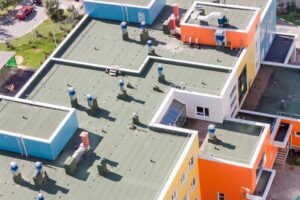
Commercial flat roofing is a popular choice for many businesses in Lakeland. Understanding the features and benefits of flat roofs, as well as the installation process and maintenance requirements, can help business owners make informed decisions about their roofing needs. In this article, we will explore the key aspects of commercial flat roofing, highlight its advantages, and provide tips for choosing the right contractor in Lakeland.
Understanding Flat Roofing Systems
Flat roofing systems are designed to provide a durable and waterproof covering for commercial buildings. Unlike sloped roofs, which have a pitched angle, flat roofs have a low or no slope. This unique design presents both advantages and challenges for businesses.
Flat roofs have been a popular choice for commercial buildings for many years due to their practicality and versatility. They offer a sleek and modern aesthetic that can enhance the overall look of a structure. Additionally, flat roofs provide a stable platform for HVAC units, making it easier to conceal these systems and maintain a clean exterior appearance.
Key Features of Flat Roofs
Flat roofs offer several notable features, including:
- Easy installation and accessibility: Flat roofs are relatively easy to install and provide convenient access for maintenance and repairs.
- Cost-effectiveness: Flat roofs require fewer materials and less labor compared to sloped roofs, making them a cost-effective choice for commercial buildings.
- Space utilization: The flat surface of the roof can be utilized for various purposes, such as rooftop gardens, solar panel installations, or outdoor gathering spaces.
Moreover, the design of flat roofs allows for the installation of additional features such as skylights or rooftop decks, expanding the functionality and aesthetic appeal of the building.
Materials Used in Flat Roofing
Various materials are used in commercial flat roofing, each with its unique characteristics and benefits. Some common options include:
- EPDM (ethylene propylene diene monomer): A synthetic rubber membrane that offers excellent resistance to UV rays and weathering.
- TPO (thermoplastic olefin): A single-ply roofing material that provides energy efficiency and durability.
- PVC (polyvinyl chloride): Known for its fire resistance and long lifespan, PVC is a popular choice for flat roofs.
Each material has specific advantages depending on the climate, building structure, and intended use of the flat roof. Contractors carefully consider these factors when selecting the most suitable roofing material for a commercial project, ensuring long-lasting performance and protection against the elements.
Benefits of Commercial Flat Roofing
Choosing a flat roof for a commercial building offers several advantages:
Cost-Effectiveness of Flat Roofs
One of the significant advantages of flat roofs is their cost-effectiveness. The simple design and easy installation process result in reduced labor and material costs. Additionally, flat roofs require fewer repairs and maintenance compared to pitched roofs.
Space Utilization and Accessibility
Flat roofs provide additional usable space for the building owners. This space can be utilized for various purposes, such as rooftop gardens, HVAC equipment installations, or outdoor recreational areas. Furthermore, the accessibility of flat roofs makes it easier to inspect, maintain, and repair the roofing system.
Moreover, the flat surface of commercial flat roofs can be used to install solar panels, which can help in reducing energy costs for the building. By harnessing solar energy, businesses can lower their carbon footprint and contribute to environmental sustainability.
Another advantage of flat roofs is their versatility in design. Building owners have the flexibility to add extensions or make modifications to the structure without the constraints posed by sloped roofs. This adaptability allows for future expansions or renovations to meet the changing needs of the business.
Installation Process of Flat Roofs
Proper installation is crucial for the longevity and performance of commercial flat roofs in Lakeland. This involves careful planning and execution of various steps.
Flat roofs are a popular choice for commercial buildings due to their cost-effectiveness and ease of maintenance. However, their installation requires expertise and attention to detail to ensure durability and weather resistance.
Pre-Installation Considerations
Prior to the installation, a thorough assessment of the building’s structural integrity should be conducted. This includes checking for any water damage, rot, or issues with the existing roof. Additionally, permits and other legal requirements must be obtained.
Furthermore, it is essential to consider the climate of Lakeland when installing a flat roof. Proper insulation and ventilation are crucial to prevent issues such as heat retention and moisture buildup, which can lead to premature deterioration of the roofing materials.
Step-by-Step Installation Guide
The installation process of commercial flat roofs typically involves the following steps:
- Clean and prepare the roof surface.
- Install protective layers, such as insulation and vapor barriers.
- Apply the chosen roofing material, ensuring proper sealing and adhesion.
- Install flashing and edge details to ensure waterproofing.
- Conduct a thorough inspection to verify the quality of the installation.
Each step in the installation process plays a critical role in the overall performance of the flat roof. Proper surface preparation ensures that the roofing material adheres securely, while the installation of insulation helps improve energy efficiency and interior comfort within the building.
Maintenance and Repair of Flat Roofs
Regular maintenance is essential to ensure the longevity and performance of commercial flat roofs. Here are some recommended maintenance tips:
Regular Maintenance Tips
- Inspect the roof regularly for any signs of damage or deterioration.
- Clear debris, such as leaves and branches, to prevent clogging of drains.
- Check for leaks or water ponding and address them promptly.
- Trim nearby trees to prevent branches from damaging the roof.
Identifying and Repairing Common Issues
Flat roofs can encounter various issues over time, such as leaks, membrane damage, or flashing problems. It is crucial to identify these issues promptly and address them with professional repairs. Regular inspections by qualified roofing contractors can help identify and prevent potential problems.
Choosing a Flat Roofing Contractor in Lakeland
When selecting a flat roofing contractor for your commercial building in Lakeland, it is essential to consider several factors:
Essential Qualities to Look for
- Experience: Choose a contractor with extensive experience in installing and maintaining commercial flat roofs.
- Professionalism: Look for contractors who are reliable, punctual, and have a strong track record of customer satisfaction.
- Licensing and certifications: Ensure that the contractor holds the necessary licenses and certifications required by local authorities.
- Insurance coverage: Verify that the contractor has liability insurance to protect your property and workers’ compensation insurance for their employees.
Questions to Ask Potential Contractors
When interviewing potential contractors, consider asking the following questions:
- How many years of experience do you have in installing flat roofs?
- Can you provide references from past clients?
- What type of warranty do you offer for your work?
- Do you have any industry certifications?
- How do you handle emergency repairs or maintenance requests?
By thoroughly evaluating potential contractors and asking pertinent questions, business owners can make an informed decision and choose a reliable flat roofing contractor in Lakeland.
Ready to ensure your Lakeland commercial property is protected with a top-tier flat roofing system? Look no further than Commercial Roofing Rana. With a legacy of excellence since 1983, our team of licensed professionals is dedicated to safeguarding your business with our precision-crafted Duro-Last roofing systems. Serving a diverse range of commercial clients across the Mid-South, including Tennessee, Kentucky, Mississippi, and Arkansas, we understand the critical importance of a reliable roof. Don’t let water damage threaten your investment. Schedule Now and let Commercial Roofing Rana provide the superior service and protection your commercial building deserves.
